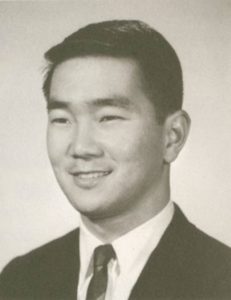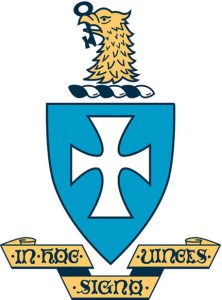The Brotherhood of Man
 During the winter of 1964, Chris Choi ’68 played in the snow for the first time.
During the winter of 1964, Chris Choi ’68 played in the snow for the first time.
Growing up in Hawaii, Choi had been ill-prepared for his first winter at Lafayette; Choi wore jeans and T-shirts when his classmates bundled up in parkas and snow pants.
Sophomore roommate Clint Smullen ’68 remembers that first snow. Choi was excited. He ran barefoot into the powder and rolled around in it. His friends joined him, laughing. After a short while, they looked at Choi’s toes.
“Hey, you better get inside,” Smullen told him. “Your toes don’t look too good.”
It wasn’t the last time Choi faced an unexpected deep freeze. The next chill came in the form of bigotry. And once again, his friends at Lafayette had his back. In 1966, when he tried to pledge the Sigma Chi fraternity, the national office rejected him.
“Someone decided because Chris was of Korean descent he was not socially acceptable,” says H. Steven Kesselman ’68, a member of Choi’s pledge class.
Rather than give in, the Lafayette chapter withdrew from its national charter, becoming Sigma Phi Chi, a local fraternity that refused to disqualify men from joining because of race.
An entire fraternity falling on its sword for one brother came with a price. Kesselman says withdrawing from the national office hurt recruiting and cost them donations from some alumni who were angry that a compromise couldn’t be reached.
But at the time, there was no shortage of fanfare. “A House With Guts” proclaimed The Lafayette student newspaper on Jan. 17, 1966. Fraternity leaders received calls from newspaper reporters.
Four decades later, it’s not something Choi wants to talk about, but the moment lives on in the memories of many members as the time they stood up for what was right.
The Phone Call

William Durham ’66 was a senior when Sigma Chi decided to offer Choi a membership.
“We thought a lot of Chris,” says Durham, now living in Georgia. Choi was personable, the kind of guy everyone thought would fit in.
Choi’s ethnicity seemed irrelevant. He was from Hawaii, which had become a state seven years earlier; Choi was as American as anybody else in Sigma Chi. As a matter of protocol, the fraternity’s leadership mailed a profile to the national office, describing who Choi was and including a picture. The national office initially gave them the green light, Durham recalls.
But on the day of the initiation ceremony, as brothers prepared for the incoming pledge class, the fraternity received a phone call.
It was the national office saying that if it allowed Choi to pledge, it would no longer be a chapter of Sigma Chi.
“We were shocked,” Durham says. “We were all surprised and disappointed.”
Ultimately, Sigma Chi opted to withdraw from the national organization.
The Blackball
It was far from a cavalier, frivolous decision. The brothers were tackling about 100 years of history.
Sigma Chi was founded at Miami University in Oxford, Ohio, in 1855. Twelve years later, Lafayette launched its own chapter on College Hill. The Lafayette chapter disbanded briefly in the 19th century before being reestablished in 1899.
Among the old guard of national college fraternities, Sigma Chi graduates include politicians, governors, Academy Award winners, and World Series champions. Members can call famous figures like John Wayne, Rip Torn, Mike Ditka, and Jim Palmer brother.
Sigma Chi’s national office is in Evanston, Ill., but Kesselman says there was a strong southern influence at the time.
Robert Valenti ’68, a member of Choi’s pledge class, remembered that the blackball against Choi came from a “stubborn oil man from Oklahoma.”
Legacy
It wasn’t the first time a Lafayette fraternity picked pledges over protocol.
In 1955, Phi Kappa Tau pledged two black freshmen, Edward Washington ’59 and Victor Partridge ’59.
The national office claimed a “gentleman’s agreement” precluded them from initiating “anyone who might cause embarrassment to any other chapter or brother.”
Lafayette’s chapter presented its case at the fraternity’s national convention in 1956, but were voted down 46 to 36.
On Oct. 23, 1956, Lafayette’s Phi Kappa Tau chapter resigned and became Delta Sigma.
Earlier in 1956, Lafayette’s academic council published a resolution to abolish all social organizations whose national constitutions prohibited members on the basis of race, religion, or color.
Within a few years, the national office of Phi Kappa Tau made constitutional changes, and the Lafayette chapter rejoined.
Sign of the Times
During the civil rights upheaval of the following decade, Lafayette’s Sigma Chi chapter wasn’t the only fraternity to confront racism.
Someone decided because Chris was of Korean descent he was not socially acceptable
Two years before Choi’s initiation, 14 fraternities at University of California and 11 at UCLA were suspended for failing to sign nondiscrimination pledges—promises that they wouldn’t bar members on the basis of race, religion, or national origin.
At Columbia University, two chapters—including that college’s Sigma Chi affiliate—faced a similar action for refusing to sign a nondiscrimination pledge. Rather than face disciplinary action, Columbia’s Sigma Chi chapter dropped its national affiliation in early October 1964 and became a local fraternity.
Kesselman says Lafayette’s Sigma Chi looked to Columbia as a model for how to maintain traditions and keep the fraternity together without the national organization. The Lafayette local went to its alumni board, which voted unanimously to authorize the withdrawal. The local brothers also went to the College, which supported the move.
Lafayette “endorses the local chapter’s right to initiate a student whose membership has been blocked by the national body, apparently because of the student’s ancestry or race,” then-president K. Roald Bergethon told The Lafayette newspaper.
On Jan. 15, 1966, the fraternity notified the national organization by letter that it was withdrawing.
The new local fraternity, Sigma Phi Chi, was “much more liberal” about its membership policies, Smullen says, and its roster became more diverse.
Standing Firm
Still, Kesselman says it hurt recruiting efforts. Sigma Phi Chi became the only local frat without a national organization on campus.
“We took our lumps,” he says. It also had a personal hurt, as well. Part of the reason the brothers had chosen Sigma Chi was because of its national reputation.
“When you’re between 18 and 24 years old and you say, ‘I’m Sigma Chi …’” says Valenti. “Well, we couldn’t say that now.”
Choi graduated with a degree in history in 1968. Today, he lives in Bucks County. He declined to comment for this article.
Sigma Chi’s national fraternity later changed its bylaws to preclude racial discrimination, and the Lafayette chapter rejoined in 1982. It disbanded in 1997 due to lack of interest.
For the guys who picked Choi over the national affiliation, Lafayette fell on the right side of history.
“It was a remarkable act,” Smullen says.